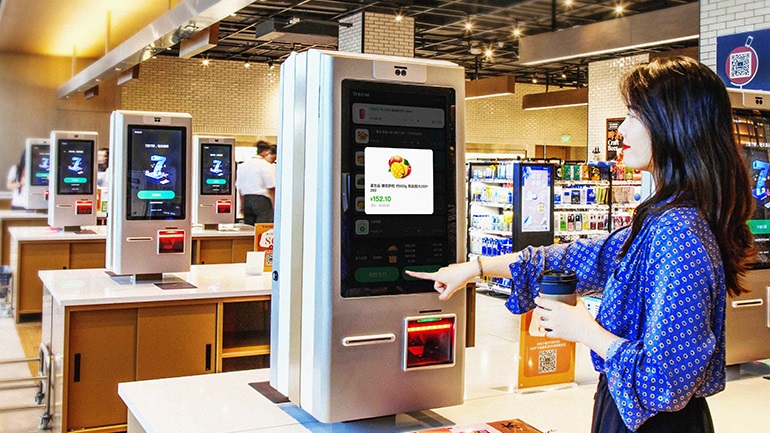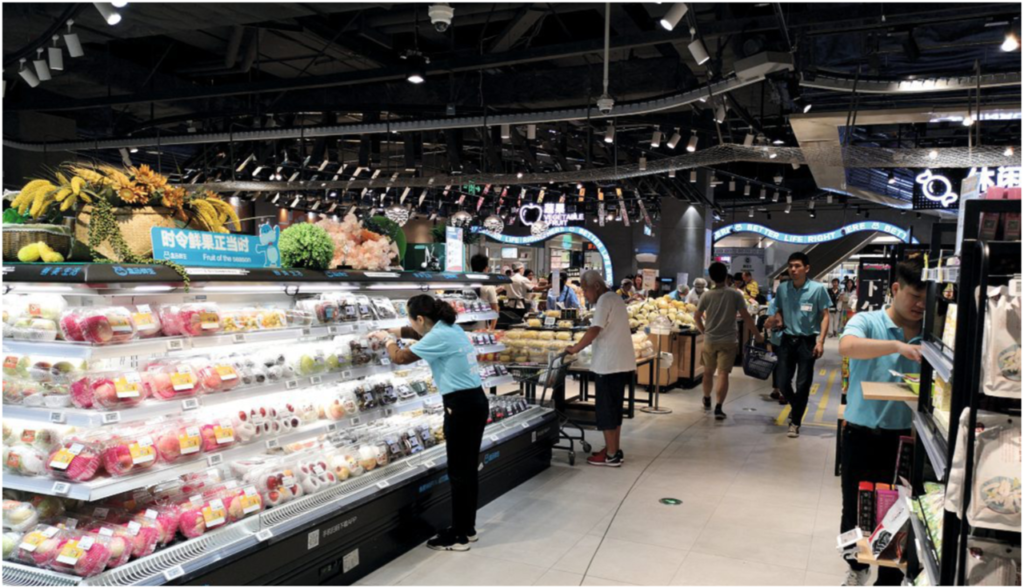The sight of shopping bags on rolling belts passing over customers’ heads is the first sign that Freshippo is no ordinary supermarket.
Shirt collectors clean the shelves, scanning the codes with a smartphone to find the exact variety of apples, sesame oil or spices that match the online orders. Once found, the items are dropped into a bag that is part of the automated transport system and forwarded to the back of the store, where delivery bikes await.
There are now more than 200 Freshippo supermarkets like this one in China – all of which function as both high-tech supermarkets and state-of-the-art delivery centers (within a three-kilometer radius, all online orders arrive within 30 minutes when a buyer clicks). Everything is owned and operated by the e-commerce giant Alibaba as part of its plan to take the lead in what it calls “New Retail”. As supermarkets in western countries emerge from the effects of the pandemic, Freshippo can provide a model for how to redefine their own stores.
For those who prefer to shop at the store, there is everything you can expect for your weekly shopping – stalls full of fresh produce, samples of new produce being distributed on trays by smiling staff and a selection of meat, fish and seafood .
Pick up a lobster, scan the barcode and the supermarket app gives you instant information on where it came from and when – even a digital certificate proving it is a product of organic fish farming. The same app will ask if you want it cooked for you in the store’s restaurant, where robotic waiters deliver dishes while you watch a movie or TV show on tablets that fit into each table.

Alternatively, if you prefer to cook at home, the app may recommend a bottle of white wine in Hallway 5, which goes perfectly with seafood. When you are ready to leave, you can pay for all of this when you leave using face recognition.
The idea for New Retail was conceived by Alibaba co-founder Jack Ma five years ago. Although Alibaba controls about 80 percent of China’s e-commerce market ($ 3.5 trillion), Ma even wanted to expand into in-store consumables, gaining a larger market share. “Books and computers are easy, but fragile goods are not so simple,” said Jeffrey Towson, head of research at Asia Tech Strategy. “It was the last sector to be conquered,” he added.
The first Freshippo store opened in Shanghai in 2016. By 2018, Alibaba had 64 stores in 14 cities. By the end of 2020, there were 246. Two years after the opening of this first store, online grocery sales in China had risen to 32.5% – driven, by a large percentage, by the rapid increase in their number, with Every Freshippo store handles “tens of thousands” of orders a day, says Guo Xulin, chief executive of Alibaba’s Freshippo Business Group, with “over 60% of Freshippo sales online.”
“Our vision for the future of retail was never digital versus physical, but the creation of a future trading infrastructure that seamlessly integrates online and offline shopping,” he added.
The company has not tried this idea just in a supermarket. “There are now high-tech shops, breakfast stations – even malls,” says Xulin. But, undoubtedly the grocery sector is where Alibaba had the most transformative effect. As a result, many of its competitors are following suit.

By the end of 2021, rival retailer JD plans to open 49 of its own SEVEN FRESH supermarkets in China. JD has changed the name it gives to the strategy – it calls it “no retail restrictions” – but that’s where the differences end.
All SEVEN FRESH stores are equipped with blockchain technology, which allows the detection of products through the supply chain. “If customers scan a QR code on some of the products, including Lake Chagan fish, imported milk and turbot, they can see all the information from breeding to transport,” says SEVEN FRESH head Helson Zheng. . This information is also displayed on digital “magic mirrors” embedded in the product.
In some stores, there are robotic trolleys that follow customers using a tracking bracelet and automatically scan items as they are loaded into the cart. JD’s existing data strategy is also to provide push notifications or SMS messages to the smartphones of (more than 400 million) e-commerce customers as they roam the store. They may be offered a discount on the brand of toilet paper they buy online or receive an offer to double the razors they ordered a month ago.
And, as with Freshippo, all SEVEN FRESH stores share delivery centers. This allowed JD to overcome a crucial point in the profitability of selling groceries online – the resources required to pick up items, pack them in bags and transport them to customers. Combining electronics with in-store stock under one roof and speeding things up with digital technologies that track items and process electronic orders has “reduced cost and increased efficiency. “Each employee can fulfill more than 120 orders a day,” says Zheng, “and the speed with which the shelves are being refilled has also improved by 30%.”
As part of its own expansion plans, JD also partnered with the traditional Jiawanjia supermarket chain in Hebei Province, equipping the offline store with all of its own digital technologies. He believes that “this is the fastest way to grow, instead of owning and operating all its own stores,” says Zheng. “This empowerment model is one of the most important methods of SEVEN FRESH expansion,” he adds.

Both Alibaba and JD say the pandemic has boosted their business. The Freshippo stores, which have been operating for more than a year, have seen “high double-digit growth,” says Xulin. “When the coronavirus first appeared, many communities closed and consumers had no way to go shopping for their regular shopping,” Zheng added. “During this period, the performance of SEVEN FRESH has increased significantly,” he adds.
And that’s just a small taste of what could follow, says Towson. “Eventually, consumers will not even know the difference between online and offline. You will walk down the aisle of the supermarket, talking to your assistant (artificial intelligence) on the cell phone as he suggests items. You will receive the sneakers you ordered online earlier that day. You will be streaming a movie on the same platform that cooks your food in the store. Everything will be a single experience.
“These stores are evolving rapidly,” Towson adds, “and the number one goal is to transform the customer service experience so that all other supermarkets look outdated.”
All of this could be food for thought for the western world supermarkets looking forward to life after the pandemic. Lockdown more than doubled their online orders during 2020 and growth looks set to continue. This leaves traditional supermarkets in a position to make strategic decisions. How can they fulfill their orders online while still being profitable? And how can they make better use of their extensive stores? It seems that China and its unique high-tech supermarkets can have all the answers.



